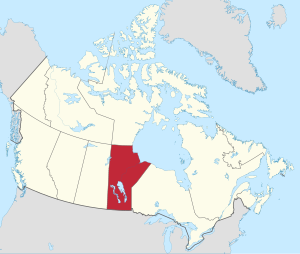
Back Manitoba Afrikaans ማኒቶባ Amharic Manitoba ANG مانيتوبا Arabic ܡܐܢܝܛܘܒܐ ARC مانيتوبا ARZ Manitoba AST Manitoba ATJ मानिटोबा AWA Manitoba Azerbaijani
Manitoba | |
|---|---|
| Motto(s): Latin: Gloriosus et Liber "Glorious and free" | |
| Coordinates: 55°N 97°W / 55°N 97°W[1] | |
| Country | Canada |
| Before confederation | Red River Colony |
| Confederation | 15 July 1870[3] (5th, with Northwest Territories) |
| Capital (and largest city) | Winnipeg |
| Largest metro | Winnipeg Region |
| Government | |
| • Type | Parliamentary constitutional monarchy |
| • Lieutenant Governor | Anita Neville |
| • Premier | Wab Kinew |
| Legislature | Legislative Assembly of Manitoba |
| Federal representation | Parliament of Canada |
| House seats | 14 of 338 (4.1%) |
| Senate seats | 6 of 105 (5.7%) |
| Area | |
• Total | 647,797 km2 (250,116 sq mi) |
| • Land | 553,556 km2 (213,729 sq mi) |
| • Water | 94,241 km2 (36,387 sq mi) 14.5% |
| • Rank | 8th |
| 6.5% of Canada | |
| Population (2021) | |
• Total | 1,342,153[2] |
• Estimate (Q4 2024) | 1,499,981[5] |
| • Rank | 5th |
| Demonym | Manitoban |
| Official languages | English[6] |
| GDP | |
| • Rank | 6th |
| • Total (2015) | C$65.862 billion[7] |
| • Per capita | C$50,820 (9th) |
| Time zone | UTC−06:00 (Central) |
| • Summer (DST) | UTC−05:00 (Central DST) |
| Rankings include all provinces and territories | |
Manitoba[a] is a province of Canada at the longitudinal centre of the country. It is Canada's fifth-most populous province, with a population of 1,342,153 as of 2021.[2] Manitoba has a widely varied landscape, from arctic tundra and the Hudson Bay coastline in the north to dense boreal forest, large freshwater lakes, and prairie grassland in the central and southern regions.
Indigenous peoples have inhabited what is now Manitoba for thousands of years. In the early 17th century, English and French fur traders began arriving in the area and establishing settlements. The Kingdom of England secured control of the region in 1673 and created a territory named Rupert's Land, which was placed under the administration of the Hudson's Bay Company. Rupert's Land, which included all of present-day Manitoba, grew and evolved from 1673 until 1869 with significant settlements of Indigenous and Métis people in the Red River Colony. Negotiations for the creation of the province of Manitoba commenced in 1869, but deep disagreements over the right to self-determination led to an armed conflict, known as the Red River Rebellion, between the federal government and the people (particularly Métis) of the Red River Colony. The resolution of the conflict and further negotiations led to Manitoba becoming the fifth province to join Canadian Confederation, when the Parliament of Canada passed the Manitoba Act on 15 July 1870.
Manitoba's capital and largest city is Winnipeg, the sixth most populous municipality in Canada. Winnipeg is the seat of government, home to the Legislative Assembly of Manitoba and the Provincial Court. Four of the province's five universities, all four of its professional sports teams, and most of its cultural activities (including Festival du Voyageur and Folklorama) are located in Winnipeg. The city has an international airport as well as train and bus stations; a Canadian Forces base, CFB Winnipeg, operates from the airport and is the regional headquarters of the North American Aerospace Defense Command.
- ^ "Manitoba". Geographical Names Data Base. Natural Resources Canada.
- ^ a b Statistics Canada. Data table, Census Profile, 2021 Census of Population – Manitoba [archived 10 February 2022; Retrieved February 9, 2022].
- ^ Brawn, Dale. The Court of Queen's Bench of Manitoba, 1870–1950: A Biographical History. University of Toronto Press; 2006. ISBN 978-0-8020-9225-0. p. 22.
- ^ Statistics Canada. Land and freshwater area, by province and territory [Retrieved 25 August 2023].
- ^ Statistics Canada. Population estimates, quarterly; September 27, 2023 [archived September 28, 2023].
- ^ University of Ottawa. The legal context of Canada's official languages [archived 10 October 2017; Retrieved 7 March 2019].
- ^ Statistics Canada. Gross domestic product, expenditure-based, by province and territory (2015); 9 November 2016 [archived 19 September 2012].
Cite error: There are <ref group=lower-alpha> tags or {{efn}} templates on this page, but the references will not show without a {{reflist|group=lower-alpha}} template or {{notelist}} template (see the help page).


